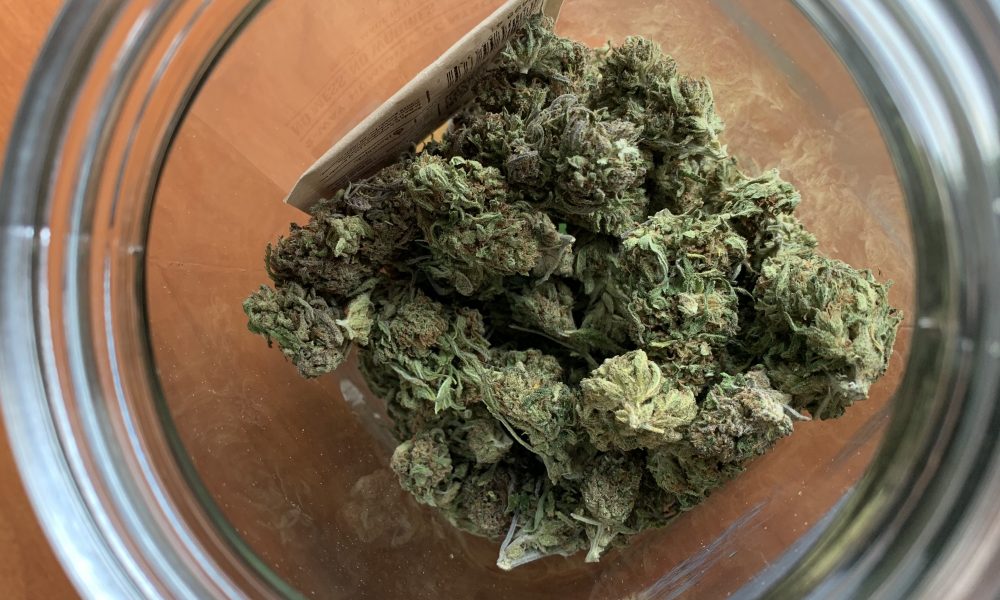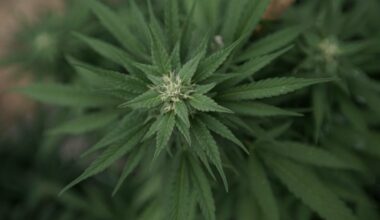A group of more than 150 celebrities, athletes, politicians, law enforcement professionals and academics signed a letter that was delivered to President Joe Biden on Tuesday, urging him to issue a “full, complete and unconditional pardon” to all people with non-violent federal marijuana convictions.
This comes as the administration is actively encouraging about 1,000 people who were temporarily placed on home confinement for federal drug offenses to fill out clemency application forms.
The new letter—signed by high-profile stars like Drake, Killer Mike, Meek Mill, Deion Sanders, Kevin Garnett, Al Harrington and more—says that the war on drugs “has crushed many souls and countless futures, while spreading intolerable levels of mistrust and dysfunction between minority communities and those sworn to protect them.”
“The harms of incarceration are obvious, but the pains of federal marijuana convictions transcend prison walls, making it more difficult for someone to get a job, access affordable housing, and receive an education,” it continues. “A conviction can forever limit an individual’s constitutional rights and can put the American dream further out of reach for an entire family.”
It also references Biden’s comments on the campaign trail supporting cannabis decriminalization and committing to expunge marijuana convictions.
“Enough is enough. No one should be locked up in federal prison for non-violent marijuana offenses,” the letter, which was coordinated by civil rights activist Weldon Angelos, who received a presidential pardon for his own cannabis conviction from then-President Donald Trump, says. “No one should continue to bear the scarlet letter of a federal conviction for marijuana offenses of the past.”
“Relief from the federal war on marijuana would not only be just, it would also be good policy by advancing public safety and economic prosperity. A general pardon poses a low risk to the American public by expunging records and releasing the last remaining prisoners of federal marijuana prohibition. Those who will have their sentences commuted comprise a small percentage of the federal prison population and are incarcerated only for non-violent marijuana offenses. All other beneficiaries of a categorical pardon represent an even lower risk, since these people are already living peacefully among their neighbors.”
The letter—which was also signed by 2 Chainz, Ty Dolla $ign and T.I.—goes on to says there’s precedent for the relief, pointing out actions taken by Presidents Gerald Ford and Jimmy Carter in the 1970s to categorically forgive Americans who avoided the draft for the Vietnam War.
Rapper Ralo, who is serving an eight-year sentence for a non-violent marijuana offense, is among the people that the letter signers say is deserving of relief. In a press release, Ralo thanked the hip hop community “for supporting my clemency because it’s just not right that corporations are allowed to violate federal law and become millionaires while people like myself go to prison for years.”
“This is hypocrisy,” he said. “But I am hopeful that Joe Biden will honor his campaign promise and grant us clemency, without delay, so that we can return home to our families and communities.”
The letter concludes by telling Biden that “a general clemency will send a clear and powerful message that our country is truly taking a new course on criminal justice policy and practice.”
Other signatories include former New Mexico Gov. Gary Johnson (R/L), former U.S. Rep. Joe Cunningham (D-SC), Grover Norquist of Americans for Tax Reform, Mark Holden of Koch Industries, clemency recipient Alice Johnson and state lawmakers in the Idaho, Illinois, Indiana, Missouri, Oklahoma and Kansas legislatures. Former federal prosecutors and other law enforcement professionals also signed on.
A coalition of advocates and lawmakers sent letters with a similar request to Biden early in his presidency in February.
White House Press Secretary Jen Psaki said during a press briefing last month that Biden is “exploring multiple avenues to provide relief to certain nonviolent drug offenders, including through the use of his clemency power.”
The administration is “working hard every day to reform our justice system in order to strengthen families, boost our economy, give people a chance at a better future,” she said. “As part of this, the president is deeply committed to reducing incarceration, helping people successfully reenter society. And he has said too many people are incarcerated—too many are black and brown.”
Psaki added at the time that there was nothing actionable to preview at that point, but said the president is “looking at a range of avenues” for relief. The fact that, as a senator, Biden played a key role in enacting punitive drug laws that contributed to the mass incarceration he’s now considering steps to resolve did not come up during the exchange.
Biden has faced criticism from drug policy reform advocates who’ve grown frustrated that he’s yet to make good on campaign promises such as decriminalizing marijuana. While his opposition to adult-use legalization remains a challenge on its own, they feel he should at least take steps to enact modest reform.
The president also campaigned on expunging prior cannabis records and respecting the rights of states to set their own laws.
Since taking office, however, his administration has not made progress on any of those pledges and has instead fired its own White House staffers over marijuana and sought to extend a budget provision that has blocked Washington, D.C. from legalizing cannabis sales.
In April, Psaki was pressed on Biden’s clemency promise for people with federal marijuana and said that process will start with modestly rescheduling cannabis—a proposal that advocates say wouldn’t actually accomplish what she’s suggesting.
Moving cannabis from Schedule I to Schedule II under the Controlled Substances Act, as Biden proposed on the campaign trail, wouldn’t facilitate mass clemency given that being convicted for crimes related to drugs in that slightly lower category—which currently includes cocaine—also carries significant penalties.
Sen. Bernie Sanders (I-VT) said during a recent interview that Biden could and should use executive authority to end federal marijuana prohibition on his own—but the two of them have “differences” when it comes to drug policy. There are, however, legal questions about whether a president could actually legalize cannabis unilaterally given existing statutes.
Read the full letter to Biden below:
Marijuana Clemency Letter to President Biden by Marijuana Moment on Scribd
Detroit Voters Will Decide On Psychedelics Decriminalization Ballot Measure In November
Medical Disclaimer:
The information provided in these blog posts is intended for general informational and educational purposes only. It is not a substitute for professional medical advice, diagnosis, or treatment. Always seek the advice of your physician or other qualified healthcare provider with any questions you may have regarding a medical condition. The use of any information provided in these blog posts is solely at your own risk. The authors and the website do not recommend or endorse any specific products, treatments, or procedures mentioned. Reliance on any information in these blog posts is solely at your own discretion.






